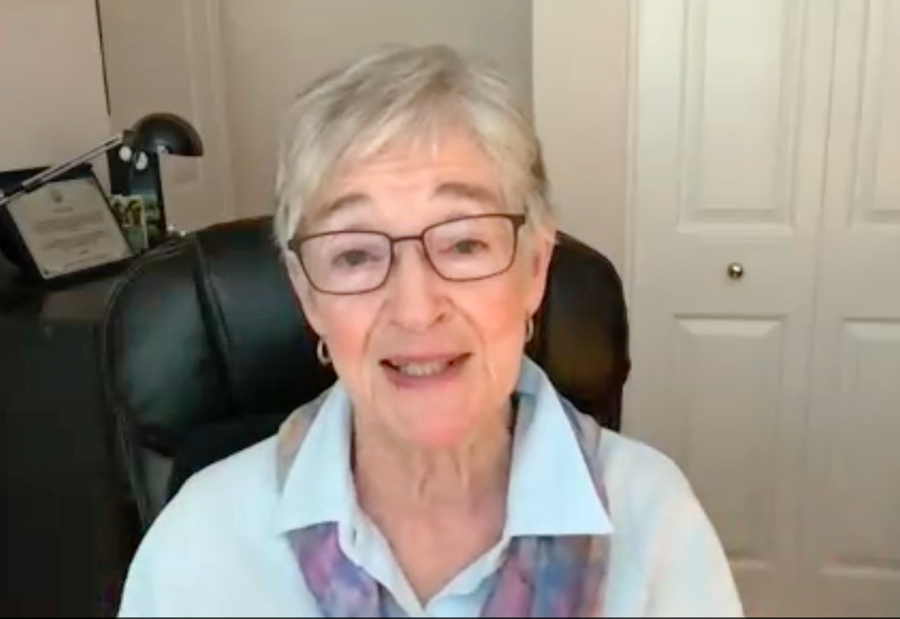GUELPH – The Wellington Water Watchers celebrated a milestone on July 30.
The grassroots organization received “Blue Community” status from the Council of Canadians.
A Blue Community is an organization that does three things:
- recognizes that water and sanitation are human rights;
- bans the sale of bottled water at events and advocates others to do so; and
- promotes publicly owned, financed and operated water and wastewater services.
“After lobbying for years for municipalities to become Blue Communities, we recently realized we could become one too,” said Water Watchers executive director Arlene Slocombe at the virtual celebration.
Robin Tress, director of campaigns and organizing for the Council of Canadians, was in Halifax and presented the award remotely.
“I’ve been a huge fan of Water Watchers since the beginning in 2007,” Tress said.
“You were the first to try to stop Nestle’s water taking and it has exploded since then. I’m glad to celebrate Water Watchers as the next Blue Community.”
Tress said there are 200 cities, towns, universities, non-governmental organizations and schools throughout the world that have become Blue Communities.
She called it a global network “that’s defending water from privatization – especially bottled water.”
Maude Barlow, a founder of the Council of Canadians and the inspiration behind the Blue Community initiative, was the keynote speaker at the event.
The Council of Canadians formed in 1985 with a goal of improving the lives of Canadians by establishing Canada’s sovereignty on the world stage – especially in the shadow of the United States.
Fair trade, Canada-U.S. relations, protecting Canada’s natural resources and water became its focus.
“With globalization and a more connected world, the council’s focus has evolved to consider Canada’s place in the global community and the interconnectedness of capitalism and corporate power,” reads a statement on its website.
Barlow has had her hand in much of the council’s work, but perhaps most significantly as senior advisor on water to the 63rd president of the United Nations General Assembly from 2007 to 2008.
There she was a leader in the campaign to have water recognized as a human right by the UN.
In 2010 the United Nations General Assembly explicitly recognized that the right to clean drinking water and sanitation are basic human rights.
That declaration has spurred much of Barlow’s subsequent work.
She is well entrenched in the battle to keep corporations from profiting from the sale of packaged water.
“One quarter of the world does not have access to clean water on a daily basis and one half of the world has no access to adequate sanitation,” she said.
“We’re not running out of water; the world is running out of accessible, clean water.”
And when bottled water is the only source of clean water in a community, as is the case in many southern hemisphere countries, water becomes not just a health issue, but a social justice issue too.
The most impacted tend to be poor, racially marginalized groups who can’t afford to buy water and certainly don’t have the means for sewage systems.
Barlow said with water being essential to human life and a human right, it should never be bought and sold for profit.
And yet it is traded on the stock market through companies like Nestle Waters, now Blue Triton, and even trading in water futures markets, meaning water is being stockpiled to sell at a profit in the future.
And so the battle continues to stop the privatization of water services and to stop the sale of packaged water on a global scale.
The David-versus-Goliath battle is daunting and exhausting, Barlow said. Yet she remains hopeful.
It is the title of her latest book Still Hopeful: Lessons from a lifetime of activism, and Barlow ended her talk on this topic.
“It’s easy to feel so overwhelmed with all the crises in the world,” she said. “The fires, the wars, the poverty.
“Have wise hope. That’s when you’re not pretending it’s not there. You just face it and still envision the future you want to see.
“Then protect everything that’s good, knowing you have to take action.”
In an interview after the session, Slocombe said the Blue Community award is not just symbolic.
“It’s a powerful way to engage constituents, like schools, universities, churches, gathering places and even workplaces,” she said.
For the Wellington Water Watchers, it’s cause for reflection.
The group began in in 2007 as a grassroots organization opposed to the province granting water taking permits to Nestle Waters at its Aberfoyle and Hillsburgh sites.
“We were hitting on the environmental concerns – litter from recycled bottles and depleting local acquifers for corporate gain – but we began to realize it really was a water justice concern,” Slocombe said.
“The packaged water industry has become a leading player in water privatization. They undermine people’s trust in municipal systems … They present false solutions to build dependence on their product.”
In Canada, it’s Indigenous people who are most impacted by a lack of clean water, with many First Nations communities under boil water advisories – some for decades.
Slocombe said the award might also boost spirits of those who have been working at water justice issues for decades.
“When people have their eyes open and get mobilized and work together, it’s inspiring what can happen,” she said.
The Wellington Water Watchers have issued three calls to action:
- sign a petition calling on the Canadian government to recognize the human rights to safe drinking water and sanitation in the federal legal framework;
- encourage your school, church, interest group or workplace to become a Blue Community; and
- financially support water justice work if you are able.
Visit wellingtonwaterwatchers.ca for more information.




